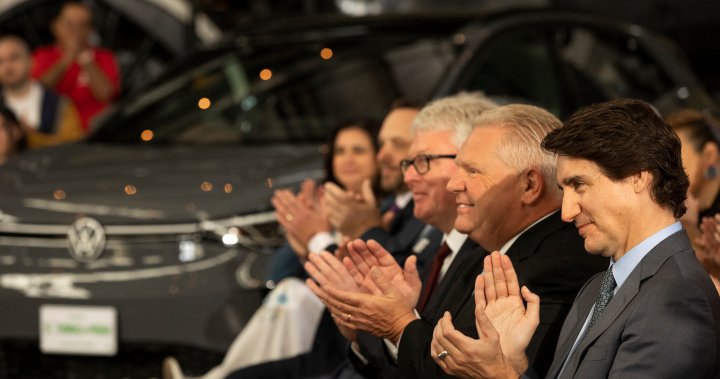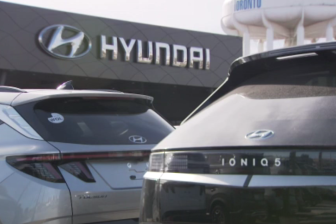A handful of temporary workers from South Korea have arrived in Windsor to staff up a new Stellantis electric vehicle battery manufacturing plant, according to officials with the Ontario government, raising concerns that massive taxpayer subsidies could be used to employ international auto workers over Canadians.
Construction on a gigafactory, a joint venture between Stellantis and LG Energy Solutions, resumed over the summer after the company received $15 billion in performance incentives from both the federal and provincial governments to produce hundreds of thousands of batteries over 10 years.
The rescue package — designed to compete with the subsidies offered under the United States’s Inflation Reduction Act — was pitched by politicians as a deal that would save thousands of auto sector jobs in the domestic labour market.
“I think this is a historic deal, it’s a great agreement and it protects the thousands of jobs quite frankly that were at stake,” Economic Development Minister Vic Fedeli said of the 2,500 people the company promised to employ.
Questions began swirling, however, after temporary foreign workers from South Korea started arriving in the city with indications that more than a thousand international workers could be landing in Windsor in 2024.

On Thursday, Windsor Police posted photos of a meeting with the South Korean Ambassador Lim Woong Son on X (formerly Twitter) to discuss the “South Korean workforce coming to our community.”
“With the new LGEnergy Solutions battery plant being built, we expect approximately 1,600 South Koreans traveling to work and live in our community in 2024,” the force said on social media.
While the provincial government declined to offer details of the contract signed with Stellantis, citing confidentiality, officials told Global News the company took steps to determine whether it could tap into Canada’s Temporary Foreign Workers program.
The government official, speaking on background, said the company went through the federal government’s Labour Market Impact Assessment (LMIA) application to demonstrate that it needed to rely on the international labour market because of insufficient domestic availability.
A spokesperson for Minister Fedeli pinned the blame on the federal government.
“We are aware of reports of international workers linked to the NextStar project under the federal work permitting system,” they told Global News in a statement. “Ontario has one of the most skilled workforces in the world and thousands of talented men and women who are more than capable of performing these jobs.”
A spokesperson for the Federal Minister of Employment insisted the deal with Stellantis would create “sustainable jobs for Canadians” and downplayed the number of international positions.
“LMIAs are only granted when Canadians or permanent residents are unable or unavailable to do a job. One LMIA for one position has been approved for this project.” The spokesperson for Labour Minister Randy Bissonnault told Global News.
“We will continue to monitor this project to ensure that it delivers on its commitment to create good paying and stable jobs for Canadians in the Windsor region.”
The arrival of international workers, however, is being slammed by critics of both the Ford and Trudeau governments, which worked side-by-side on the $15-billion deal with Stellantis.
Ontario NDP Leader Marit Stiles said she was “deeply concerned” with the deal.
“This deal was supposed to guarantee jobs right here in Ontario, jobs for people in the Windsor region,” Stiles said on Friday. “We gotta hope they didn’t just sell us a bill of goods here.”
The federal Conservatives, meanwhile, urged the Prime Minister to “come clean and release the contracts” with Stellantis and other international auto manufacturers and ensure Canadian workers are first in line.
“[Trudeau] must guarantee that Canadian tax dollars won’t fund jobs unless they are for Canadian workers,” said Rick Perkins, the Conservative shadow minister for Innovation, Science and Industry.
The sentiment was echoed by Unifor president Lana Payne who, the union said, has started a dialogue with Stellantis and the federal government about the issue.
“Unifor is investigating reports on the use of temporary foreign workers at the NextStar battery plant in Windsor,” Payne told Global News. “Our position is clear that jobs in the EV battery related supply chain must be good, union jobs and made available to qualified Canadian workers first and foremost.”
What’s unclear is whether the company planned to rely entirely on Canadian workers to staff the gigafactory or to look to the international labor market to run the plant.
After the renegotiation, Stellantis’s North American chief operating officer Mark Stewart said the deal with the governments indicated a “shared commitment to protecting thousands of new jobs.”
Initially, the company seemed to follow through, flying out a team of 100 engineers and technicians to Poland, China and South Korea for training in how to operate a large-scale lithium-ion battery plant. The team would be tasked with training the thousands of employees who would eventually run the facility.
In an August interview with Global News, however, the CEO of Nextstar Energy — the company formed out of the joint LG-Stellantis venture — suggested international labourers could be hired.
“We are not just limiting our outreach to the Windsor area but Windsor, Ontario as well as outside Ontario,” Danies Lee said. “Definitely, we need to see how the market is responding to our need.”
While Lee said the workforce would be “predominantly from Canada,” he said the company would need to assess whether the domestic market could be trained and upskilled to the “level that we need.”
Global News asked Lee directly whether the company would need to import part of its workforce from South Korea.
“Absolutely it would be a possibility, but obviously our preference is to have people… from the Windsor area.”
Currently, NextStar Energy has 22 job openings advertised on its website for technicians, lawyers, IT specialists and assembly production supervisors.
Some positions come with a unique requirement: “Fluency in Korean preferred.”




